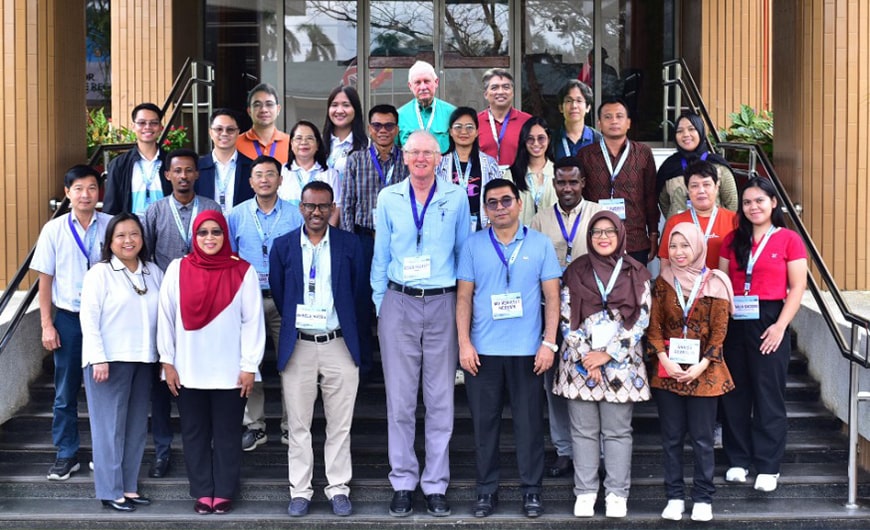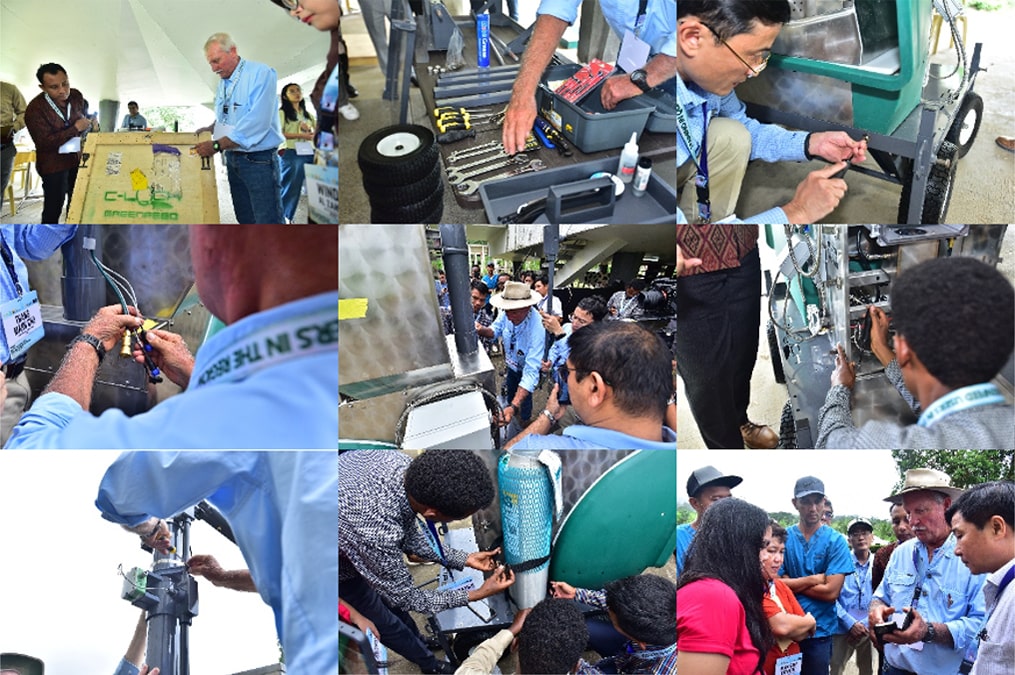 Participants and trainers of the Training on Quality Assurance for Livestock Greenhouse Gas Measurement pose in front of the SEARCA headquarters.
Participants and trainers of the Training on Quality Assurance for Livestock Greenhouse Gas Measurement pose in front of the SEARCA headquarters.
LAGUNA, Philippines – A groundbreaking three-day training titled Quality Assurance for Livestock Greenhouse Gas (GHG) Measurement was concluded on 6 February 2025, marking a significant step forward in enhancing GHG monitoring for sustainable livestock management in Southeast Asia.
Hosted at the University of the Philippines Los Baños-Dairy Training and Research Institute (UPLB-DTRI) by the Southeast Asian Regional Center for Graduate Study and Research in Agriculture (SEARCA), the training brought together 17 participants from Bangladesh, Cambodia, Ethiopia, Indonesia, the Philippines, Thailand, Vietnam, and the US, fostering regional collaboration on livestock GHG management. This initiative, jointly led by the Philippine and Vietnam Greenhouse Gas Measurement Hubs, was supported by the New Zealand Government's Climate Smart Agriculture Initiative and the University of California, Davis.
Held from 4 to 6 February 2025, the workshop aimed to enhance participants' skills in operating and maintaining GreenFeed™ units that measure livestock GHG emissions, such as methane and carbon dioxide.
 (L-R): Prof. R. Hegarty (NZAGRC), Dr. S. Wassie (UC Davis), Dr. A. Angeles (UPLB) and Dr. Nur Azura Binti Adam (SEARCA)
(L-R): Prof. R. Hegarty (NZAGRC), Dr. S. Wassie (UC Davis), Dr. A. Angeles (UPLB) and Dr. Nur Azura Binti Adam (SEARCA)
The training opened at SEARCA with participants welcomed by Prof. Roger Hegarty, GHG Measurement Trainer from the New Zealand Agricultural Greenhouse Gas Research Centre (NZAGRC); Dr. Shimels Wassie, Research Program Manager for the Global Methane Hub Project at the University of California, Davis; Dr. Amado Angeles, Dean of the College of Agriculture and Food Science at UPLB; and Dr. Nur Azura Binti Adam, SEARCA's Deputy Director for Programs. Dr. Nova Ramos, Head of SEARCA's Education and Collective Learning Department - Training for Development Unit (ECLD-T4DU), introduced the participants and the technical working group.
Prof. Hegarty set the stage with an engaging lecture on the role of GreenFeed™ in livestock GHG measurement, describing it as "remarkably effective."
Participants engaged in practical hands-on sessions, where they unpacked, assembled, and commissioned the GreenFeed™ unit under the guidance of Mr. Graeme Bremner, Consultant, NZAGRC. The session covered equipment setup, package verification, safety protocols, and troubleshooting techniques. Participants also learned to navigate the GreenFeed™ User Interface and the Control Feed App, enabling them to monitor live data and execute commands remotely.
 Participants assemble the GreenFeed™ unit guided by Mr. Bremner, who also demonstrates how to use Control Feed App on a smartphone.
Participants assemble the GreenFeed™ unit guided by Mr. Bremner, who also demonstrates how to use Control Feed App on a smartphone.
The second day of the training centered on troubleshooting and calibration, with participants practicing modem and SIM card installation, gas recovery, and equipment maintenance. They also toured UPLB-DTRI's Dairy Technology, Breeding and Physiology, and Nutrition laboratories, gaining insights into various tools used in animal science research.
The last day of the training emphasized experimental design, data integrity, and best practices in GHG measurement. Participants learned to interpret collected data and develop actionable strategies for measuring methane emissions from livestock operations. Individual hands-on exercises on GreenFeed™ unit maintenance and an introduction to the headbox respiration chamber, as well as best practices for managing animals during experiments, were covered.
The training equipped participants with the skills and knowledge to effectively commission, operate, and maintain GreenFeed™ units in real-world applications and ensure accurate and reliable GHG measurements.
This initiative is part of NZAGRC's ongoing efforts to bolster international collaboration in GHG measurement, contributing to efforts to reduce methane emissions and reinforcing the role of livestock research in climate action and sustainable agricultural practices.